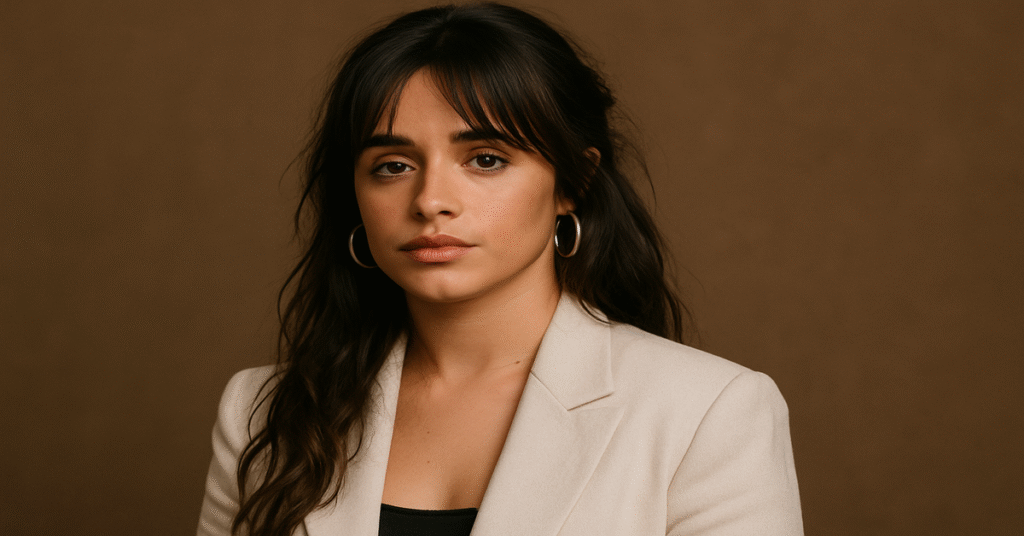In the modern entertainment landscape, celebrities are held accountable not just for their talent and work, but also for their past actions, beliefs, and behaviors. One figure who has experienced this dynamic firsthand is Camila Cabello, a Cuban-American singer-songwriter who rose to fame as a member of Fifth Harmony before establishing a successful solo career.
While her musical success is undeniable, Cabello has also found herself at the center of controversy—particularly related to past accusations of racially insensitive behavior. These controversies have sparked public discussions around racism, cultural awareness, and the responsibilities of public figures. This article explores Camila Cabello’s journey through controversy, the public reaction, the evolving cultural context, and her response.
Who is Camila Cabello?
Rise to Fame with Fifth Harmony
Camila Cabello was born in Cuba and immigrated to the United States as a child. Her rise to stardom began with her appearance on the reality show The X Factor USA in 2012, where she became part of the girl group Fifth Harmony. The group quickly gained popularity with hits like “Worth It” and “Work From Home”.
Solo Career Success
In 2016, Cabello left Fifth Harmony to pursue a solo career. Her 2018 debut album Camila featured chart-topping singles such as “Havana” and “Never Be the Same.” She established herself as a mainstream pop artist with a distinctive sound, blending Latin influences with modern pop.
Understanding the Controversy
What Sparked the Accusations?
The controversy surrounding Camila Cabello emerged when social media users resurfaced posts and reblogs from her old Tumblr account, allegedly containing racially insensitive and offensive content. These posts, which included memes and jokes that played on racial stereotypes, sparked widespread criticism.
While many of these posts dated back to when Cabello was a teenager, the public response was strong, reflecting a zero-tolerance approach to racism and hate speech—even if from the past.
Public Reaction
Social media platforms exploded with reactions. Some fans expressed disappointment and heartbreak, especially those who felt personally targeted or marginalized by the content. Others argued that the posts were old and that she was too young to fully understand their implications at the time.
Still, many called for her to take responsibility and apologize—regardless of how much time had passed.
Cultural and Social Context
Accountability in the Age of Social Media
In the era of digital permanence, no action online truly disappears. Platforms like Twitter and Tumblr preserve years of content that can be resurfaced at any time. For celebrities like Cabello, this means that past behavior, however distant, can have immediate present-day consequences.
Racism in Pop Culture
The entertainment industry has long struggled with issues of racism and racial bias, both overt and covert. Jokes, stereotypes, or language that may once have gone unnoticed or unchallenged are now more likely to be scrutinized as awareness of social justice issues grows.
Growth vs. Cancellation
The controversy around Camila Cabello also plays into the broader debate around “cancel culture”—a term used to describe the public “canceling” or boycotting of a celebrity or public figure due to objectionable behavior. The tension lies in distinguishing between:
- Punitive cancellation (permanently disavowing someone)
- Restorative accountability (allowing space for learning and change)
Camila Cabello’s Response
Public Apology
In response to the backlash, Camila Cabello issued a public apology acknowledging her past actions and expressing regret. She noted that she was “deeply sorry” and ashamed of her earlier behavior, attributing it to ignorance and immaturity.
She emphasized that she no longer holds the beliefs reflected in those old posts and affirmed her commitment to learning, growing, and doing better.
Community Involvement
Following the incident, Cabello took steps that appeared to reflect a genuine effort to educate herself and support marginalized communities. These included:
- Participating in racial equity workshops
- Publicly supporting organizations working for racial justice
- Using her platform to amplify minority voices
Though critics argued that these actions might be driven by PR, many fans and observers appreciated her willingness to evolve.
The Celebrity Dilemma: Fame, Mistakes, and Redemption
Why Celebrity Accountability Matters
Celebrities wield immense influence, especially over young audiences. When they make mistakes—particularly involving race, gender, or identity—it’s critical for them to address it transparently. Camila Cabello’s controversy reflects:
- The power of influence in shaping norms and perceptions
- The necessity of public accountability
- The capacity for people to grow and evolve over time
Double Standards and Selective Outrage
It’s also worth considering the double standards in public reactions. Not all celebrities are treated equally. Factors such as gender, ethnicity, and popularity often influence how swiftly and harshly the public reacts. In Cabello’s case, her background as a Latina artist adds complexity to the conversation.
Learning from the Controversy
Lessons for the Entertainment Industry
The incident underscores the need for:
- Cultural sensitivity training within the music and film industries
- Encouragement of diverse voices in creative and executive roles
- Transparent consequences for racist or discriminatory behavior
Lessons for Audiences
Audiences, too, have a role to play. It’s important to:
- Hold public figures accountable without resorting to harassment
- Support individuals willing to change and grow
- Recognize the difference between genuine remorse and performative apology
Camila Cabello Today: Moving Forward
Artistic Evolution
Following the controversy, Camila Cabello has continued her music career, releasing new music, performing at global events, and participating in major collaborations. Her post-controversy era seems to focus on themes of self-reflection, cultural pride, and emotional vulnerability.
Philanthropy and Activism
In addition to her music, Cabello has aligned herself with social causes, including:
- Immigration rights
- Mental health awareness
- Racial equity initiatives
These actions suggest a shift in her public image—from pop star to artist-activist.
The Broader Implications of Celebrity Controversies
Should We Forgive Public Figures?
This question lies at the heart of cancel culture and redemption. If a celebrity apologizes and makes tangible efforts to change, should we forgive them? Or are some actions unforgivable, no matter how long ago?
This is not a one-size-fits-all question. In Cabello’s case, many believe she has demonstrated growth. Others feel the pain caused by such behavior lingers.
Can Public Figures Change?
The case of Camila Cabello invites a nuanced view:
- Yes, people can change, especially when exposed to new experiences and perspectives.
- Yes, public accountability can lead to personal growth—if it’s sincere.
- Yes, we can demand better from celebrities without completely erasing them.
Conclusion
The controversy involving Camila Cabello and the resurfacing of racially insensitive content from her past shines a light on the complexity of navigating fame in the digital age. It reflects a broader cultural shift—one that demands accountability, growth, and understanding from those in the spotlight.
Camila Cabello’s journey from controversy to reflection and action is not unique, but it is instructive. It illustrates how celebrities, like anyone, are capable of making mistakes, learning from them, and becoming advocates for change. What matters most is how they respond when faced with the consequences of their actions.
The conversation doesn’t end with an apology. It continues in the choices, words, and actions that follow. Whether Camila Cabello’s efforts resonate with all members of the public remains a matter of perspective. But her experience adds to an ongoing dialogue—one that’s shaping the future of celebrity culture, accountability, and social progress.
FAQs
1. What was the controversy involving Camila Cabello?
The controversy stemmed from resurfaced Tumblr posts she had shared as a teenager that included racially insensitive memes and content, sparking criticism and public backlash.
2. Did Camila Cabello apologize for the posts?
Yes, she issued a public apology expressing regret, stating that she was ashamed of her past behavior and committed to learning and doing better.
3. How has she responded to the criticism?
In addition to her apology, Cabello reportedly attended racial sensitivity workshops and used her platform to support social justice initiatives and marginalized communities.
4. What impact did the controversy have on her career?
While it caused public backlash and debate, Camila Cabello’s career has continued, with ongoing musical releases, activism, and public engagements showing signs of growth.
5. Why is this controversy important in the larger context?
It highlights the broader issues of racism in entertainment, the permanence of digital footprints, and the need for accountability and education among public figures.
6. Can celebrities recover from such controversies?
Yes, recovery is possible when there is sincere accountability, meaningful change, and consistent actions that reflect growth and awareness.







